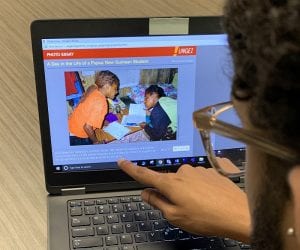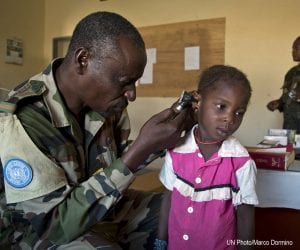As the internet transforms our lives and the way we interact with media, those who are unable to access technology can be left out of important conversations. Data from the International Telecommunications Union shows that computer and internet usage amongst youth varies radically around the world and unsurprisingly, lower income nations tend to see much lower rates of access. When at least a trillion dollars of our global economy relies on the internet, this lack of equal access means a lack of equal participation in the world. So it is timely that this year’s International Literacy Day theme is “Literacy in a Digital World.”
The Power of Literacy
Every year on September 8, the United Nations honors International Literacy Day to celebrate our victories (we’re now at about 91% literacy amongst adults worldwide) and reflect on the progress we have yet to make (there are still 781 million illiterate adults, two-thirds of whom are women).
While literacy for its own sake is empowering, it is also closely tied to other important development goals. Economies thrive when a country’s workforce can read and write, and crime is reduced when young people have the ability to access written information as well as find meaningful employment. Literacy can also lead to better health, as citizens become able to read about sanitation, medication, and preventing the spread of diseases. Women’s literacy is especially powerful—it strongly correlates to reduced infant mortality, reduced maternal mortality, and ultimately, lower fertility rates that slow rapid population growth.
5 Global Organizations Taking Action on Digital Literacy
To reap the social and economic benefits of increased literacy, the internet must be used as a tool to improve access for people of all ages, races, and economic backgrounds. UNESCO awarded prizes this year to five organizations doing just that—reaching people who were formerly marginalized and providing them with the resources they need to effectively read and write in an increasingly digital world. Check out the work they are doing below:
1. The Citizens Foundation– This literacy program with an online platform serves women and out-of-school girls in Pakistan, operating in the most impoverished parts of the country. Over 85% of their schools are community-run, and in 2016 they enrolled over 14,000 girls and women, teaching literacy, numeracy, and essential life skills.
2. We Love Reading– First started as a sort of informal library network, this organization uses an app to organize community read-alouds in Jordan, as well as providing access to a digital library of kids’ books and giving parents tips about helping their children read. Their volunteers have been inspired to bring the model and training elsewhere, including refugee camps, where many children are not able to receive formal schooling.
3. Using Educational Technology to Develop Essential Educational Competencies in Sub-Saharan Africa– Concordia University in Canada has developed a Learning Toolkit Plus program that promotes literacy, especially among elementary schoolers in Kenya, through digital tools. The software teaches early literacy and even provides a source of free e-books, including Kenyan stories. They also train teachers how to use the software in the classroom.
4. Growing FunDza Fanz readers and writers– This South African non-profit created an online platform to provide interesting local reading material and foster a love of reading for pleasure amongst teens and young adults. This is especially vital considering a 2016 survey found that over half of South African households did not contain a single book to read for leisure. Students can now see their own lives and world reflected in their reading, and they can interact with the Fundza.mobi app on social media, promoting discussion and a sense of community.
5. AdulTICoProgram– The Secretariat of the City of Armenia in Colombia launched this program to provide digital skills to senior citizens, teaching them through an interactive seminar how to use the internet. While they start with the basics like navigating and posting on social media, they also include consultation and networking services.




